How bleak is the future for high street shops?
At the BBC, Nell Mackenzie reports on how in the UK, the shop Lush changed its high street premises into "dark stores": retail outlets that are used exclusively for online shopping (although they have now opened up to footfall as lockdown ends).
She reports that facilities to process, pack and dispatch customer orders are not the most sought-after type of commercial property in the UK.
The future for physical shops could be offering more of an "experience" for customers, for example with opportunities to try out the product, like Apple stores at present.
Meanwhile, sticking with the BBC, a TV drama about investment banking is out. The show Industry depicts five graduates at a fictional top investment bank: Pierpont & Co. Unlike other portrayals of the sector like Wolf of Wall Street or The Big Short, it focuses on the bottom of the totem pole, so you get a sense of the awkwardness, ambition and cynicism of young hotshots. It is also a nice change for the programme to be set in London, rather than stateside.
Industry is sensationalist, as you might expect. Some details also seem wide of the mark: one of the grads is lauded for a trade idea centred on the premise of Treasuries hitting 4% in the event of US-China conflict.
Still, other parts ring true, from the vocabulary (e.g. yard for billion) to the demographics (internationalised but struggling with other aspects of diversity) to the culture of long hours. It's well filmed with convincing acting — worth a watch.
Finally, how to invest in fixed income when prices have been lifted by low rates and quantitative easing, yet much uncertainty remains on the path out of Covid-19 restrictions?
Algebris Investments has a couple of ideas, and it has helpfully published an extract from The Silver Bullet, its macro letter; Alberto Gallo is head of the firm's macro strategies.
"In credit, we see still attractive risk-reward in sectors linked to economic reopening and in convertible bonds," it says.
It reckons credit in the hospitality and travel industries is still more than 100bp wider than "defensive" credits, with energy firms 250bp wider.
"Within re-opening sectors, we focus on issuers with nine to 12 months in liquidity and/or support of a relatively strong government," it says.
Algebris thinks bonds issued by major cruise lines are attractive, because this is a concentrated industry with high barriers to entry, and the firms have high asset-to-debt ratios. It namechecks Royal Caribbean Cruises, Carnival Corp and Norwegian Cruise Line Holdings.
As for airlines: "Valuations remain attractive, while government backing often limits downside in some cases, like Finnair, Lufthansa or Air Baltic."
In terms of asset classes, Algebris likes convertible bonds, which have not been targeted by central banks in the same way as other bonds, and European high yield spreads. And it is bullish on smaller banks that may be snapped up in banking sector M&A. Algebris recently agreed to sell a stake in Italian bank Credito Valtellinese to Crédit Agricole.

